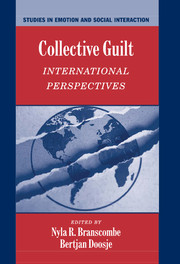Book contents
- Frontmatter
- Contents
- Preface
- List of Contributors
- Collective Guilt
- Section 1 Defining the nature of collective guilt
- Section 2 The Relationship Between Group Identification and Collective Guilt
- 6 Consequences of National Ingroup Identification for Responses to Immoral Historical Events
- 7 Refining the Meaning of the “Collective” in Collective Guilt: Harm, Guilt, and Apology in Australia
- 8 Exonerating Cognitions, Group Identification, and Personal Values as Predictors of Collective Guilt among Jewish-Israelis
- 9 It Depends on Your Point of View: Implications of Perspective-Taking and National Identification for Dutch Collective Guilt
- 10 Collective Guilt, National Identity, and Political Processes in Contemporary Germany
- Section 3 Consequences for Intergroup Relations
- Section 4 Commentary on the Volume
- Index
- References
7 - Refining the Meaning of the “Collective” in Collective Guilt: Harm, Guilt, and Apology in Australia
Published online by Cambridge University Press: 05 January 2012
- Frontmatter
- Contents
- Preface
- List of Contributors
- Collective Guilt
- Section 1 Defining the nature of collective guilt
- Section 2 The Relationship Between Group Identification and Collective Guilt
- 6 Consequences of National Ingroup Identification for Responses to Immoral Historical Events
- 7 Refining the Meaning of the “Collective” in Collective Guilt: Harm, Guilt, and Apology in Australia
- 8 Exonerating Cognitions, Group Identification, and Personal Values as Predictors of Collective Guilt among Jewish-Israelis
- 9 It Depends on Your Point of View: Implications of Perspective-Taking and National Identification for Dutch Collective Guilt
- 10 Collective Guilt, National Identity, and Political Processes in Contemporary Germany
- Section 3 Consequences for Intergroup Relations
- Section 4 Commentary on the Volume
- Index
- References
Summary
“ … While going some distance toward reconciliation with the Aborigines, Australia has moved very little to extinguish racism. Australians' traditional optimism and patriotism were only marginally tamed by the new racial tension in a society that seemed irredeemably racist, sexist and xenophobic.”
Barkan (2000, p. 237)Barkan's chapter on Australia in his book, The guilt of nations, is a rich source of insights. There is, however, one important way that this quote fails to capture important ideas that we explore in this chapter. Specifically, we propose that collective guilt in Australia cannot be understood by assuming that a uniform ideology that can be summarized neatly as racist, sexist, xenophobic, optimistic, or patriotic is widely shared in Australian society. Rather, there are fault lines within Australian society that reflect social conflict. The social conflict is not so much between racial or ethnic groups, but is about these groups. Collective guilt in Australia has very much to do with an ongoing debate that lends itself extremely well to an intergroup social psychological analysis. In this chapter, we consider the political context and social psychology of collective guilt in Australia and discuss some empirical research on this issue. In conclusion, we suggest a theoretical resolution to the paradoxical relationship between social identification and collective guilt.
The Australian context
Before considering the social psychology of the current situation, it is useful to outline the historical and political context of Australia (matters that are discussed in detail by Augoustinos & LeCouteur, this volume, Chapter 13).
- Type
- Chapter
- Information
- Collective GuiltInternational Perspectives, pp. 112 - 129Publisher: Cambridge University PressPrint publication year: 2004
References
- 22
- Cited by

